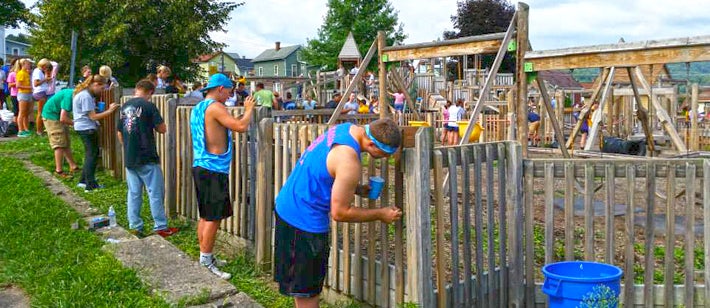
One of Pitt-Johnstown's top priorities is being a good community citizen. It was the members of the Greater Johnstown community who helped to establish our school in 1927 in space at a local elementary school. More than 85 years later, thanks to the continued support of the community, Pitt-Johnstown now occupies more than 650 acres and is a foremost contributor to the economic, social, and educational development of our region.
In this latest venture to better our community, more than 300 students were transported to the Woodland Playground in Johnstown's Moxham neighborhood to help transform the facility. The volunteers mowed grass, removed weeds, stained the playground’s signature wooden structures, and spread mulch. The Russell House and Park Avenue Playground were also service destinations in Moxham, which is the neighborhood where Pitt-Johnstown first established roots prior to moving to its current Richland Township campus.
Here are some examples of the ways Pitt-Johnstown gives back to our community*:
- Overall economic impact on the region: $150+ million
- Amount of charitable giving by Pitt-Johnstown faculty, staff, & students: $922,950
- Value of volunteer time performed by Pitt-Johnstown faculty, staff & students: $3.6 million
- Number of service hours performed by Pitt-Johnstown students: 14,141
- Number of Pitt-Johnstown students who engaged in volunteer service: 2,510
- Number of individuals served by Pitt-Johnstown student volunteers: 3,650
- Number of organizations served by Pitt-Johnstown student volunteers: 58
- Number of organizations conducting charity walks on campus: 10
- Number of Conference Center guests: 18,387
- Number of Pasquerilla Performing Arts Center guests: 21,890
- Number of meals served to the community: 1,128
- Number of young people tutored/mentored: 689
- Number of bags of trash collected: 404
- Number of houses built (equivalent): 3
- Number of community gardens built: 6
- Amount of non-perishable food items donated (in pounds): 200
- Recycling – office paper (in tons): 10
- Recycling – cardboard (in tons): 40
- Recycling – newspapers (in tons): 49
- Recycling – magazines (in tons): 20
- Recycling – aluminum cans (in tons): 5
- Recycling – plastic (in tons): 13
- Recycling – scrap metal (in tons): 21
The University of Pittsburgh's Board of Trustees met in a public session on Friday, Sept. 27, at 10:30 a.m. in the Living-Learning Center at the University of Pittsburgh at Johnstown. That day, President Jem Spectar, Frank Janakovic, Mayor of Johnstown, Mike Kane, President and Executive Director for Community Foundation for the Alleghenies, Tom Kurtz, President and CEO of the Chan Soon-Shiong Institute of Molecular Medicine at Windber, John Wozniak, former Pennsylvania State Senator, and Ed Sheehan, President and Chief Executive Officer of Concurrent Technologies Corporation, discussed Pitt-Johnstown’s impact on the local economy.Ed Sheehan, President and Chief Executive Officer of Concurrent Technologies Corporation, said, “More than 25% of our employees are UPJ graduates with many students doing internships. The quality of education and work ethic of Pitt-Johnstown students is unparalleled. Pitt-Johnstown engineering students solve manufacturing problems. We have the best and brightest in our backyard. When we move our employees from Johnstown to other locations, Pitt-Johnstown students fly to the top because of the skills they learned at UPJ.”
Tom Kurtz, President and CEO of the Chan Soon-Shiong Institute of Molecular Medicine at Windber, said, “Over 23% of our work force are Pitt-Johnstown graduates. UPJ students take many of the internships offered at the Institute, in fact, the last five openings we hired were UPJ graduates. Johnstown lost its mills, without this college there would be no Johnstown.”
Click here to learn more about Pitt-Johnstown's commitment to sustainability.
